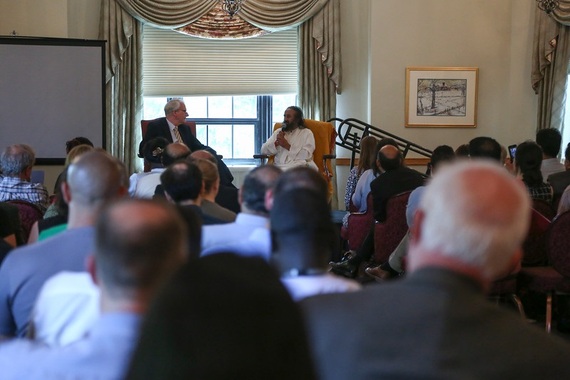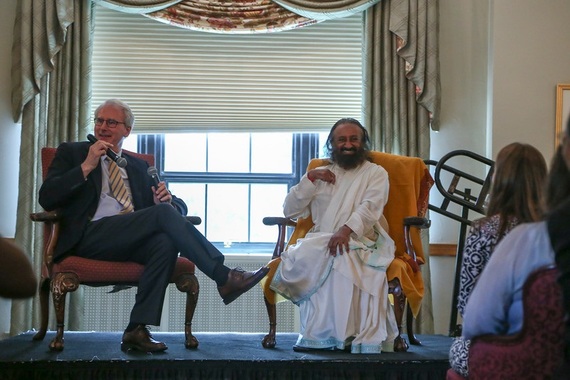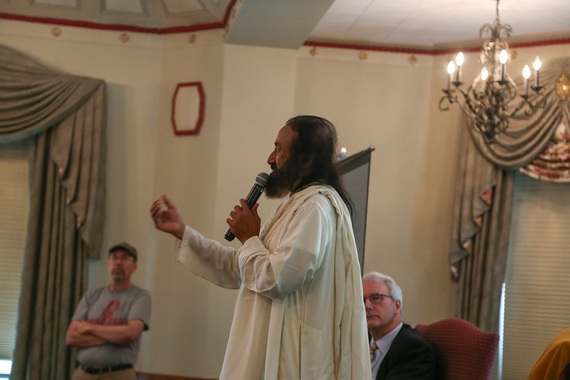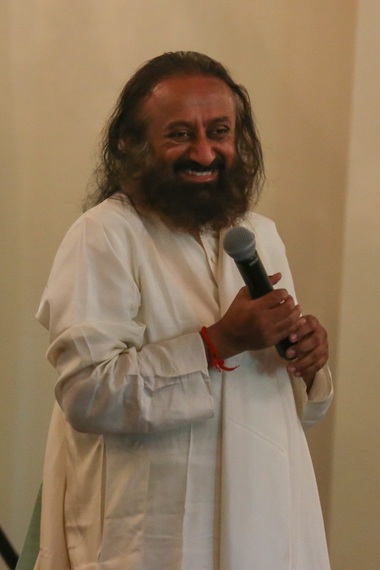In March of this year, when I attended the World Culture Festival in India, and was afforded the chance to invite Sri Sri Ravi Shankar to come to The Ohio State University and speak with my colleagues about his work, I could hardly imagine he would say yes. Even more surprising is that a humanitarian as busy as he is could fulfill the invitation so soon, arriving only three months after me and my Art of Living Columbus community invited him.
On June 27th, sponsored by various colleges and departments, Sri Sri started his Ohio State visit with a talk on his peace and mediation work. With all the religious conflict, terrorist attacks, and gun violence in the world happening right now, his talk seemed all the more relevant and timely, which is perhaps why the room was filled with so many of OSU's administrative, faculty, and student leaders. It was a packed house.
He stated there are several basic shared values that we cannot compromise and that should be viewed above our religious, ethnic, or cultural situations. Gender equality, animal rights, and environmental stewardship should be adhered to as shared human values, and a rational scientific approach must be our guiding light.
When asked by Dr. Rick Herrmann, the chair of the Political Science Department at Ohio State University, whether Sri Sri saw a conflict between science and spirituality, Sri Sri stated the he did not see a tension, and that eastern philosophy and science were complimentary.
There are two strains of (spiritual) thought, the orient and the occident. The occident says we first believe and then we will experience one day. In the orient, it is the opposite, we first experience and believe later. Science says we first experience and then we believe. This is why, in the east, science and spirituality were never in conflict, because their parameters or modus of operandi is the same.
Perhaps because of Sri Sri's adherence that one should first experience something before believing is why his approach to world peace starts with the person, at the individual level. He states that "societal movements are formed by individuals. The individual is the basis of the society. It is the individual that makes decisions in the society. If they are disturbed or if their perception is colored, what will result in their decisions?" As a long time student of Sri Sri's, I can say from personal experience that he walks the talk by helping the smallest of personal problems to the largest of societal issues.
While he was in Columbus, he took the time to give me advice on my professional and personal development, my health issues, and he even took the time to talk to me about my relationship concerns. In fact, he dealt with the latter for a solid 20 minutes, and even took the time to pause and meditate on it before giving a solid answer about how he thought I should best proceed. He did not judge, and in fact he even treated the topic in a playful manner. Not long after that, he attended to a text about the terrorist attack in Istanbul, and 20 minutes later, I walked him to the stage at OSU's Archie Griffin Ballroom, where he led 750 people through meditation in the "Get Happy Columbus" workshop.
His ability to stay centered as he tends to the smallest of issues and the largest of catastrophes astounds me. One of his secrets, he will share with you, is our own breath.
The breath helps you to calm down your own emotions. When your emotions are calm and serene your intellect becomes very sharp and your perception, observation and expression improves. Your intuitive ability also improves. The breath is the link between the body and mind. The emotions in the mind make many people feel bad or upset. What to do when one is upset, angry, jealous, or traumatized? When these negative emotions come up it is the breath that helps you reverse the situation. It makes you peaceful or happy. It empowers one to handle one's own mind and keep the mood upbeat.
OSU research scientist Sathya Dev Unudurthi, who works for the OSU Davis Heart and Lung Institute, has a hobby of researching breathing and meditation techniques. Sathya tells me that Sri Sri's main technique, the Sudarshan Kriya or SKY, has been scientifically validated to enhance brain, hormone, immune and cardiovascular system function, and significantly reduce stress, depression, anxiety and PTSD.
Because of all the recorded benefits, many of Sri Sri's breathing programs have been used in some premier colleges in India to reduce suicide, and positive results in both mental and physical health have been documented. In addition to breathing he said we need to increase our joy and enthusiasm on campuses, and one way to do this is by making more friends. "If you can't be friendly with 500 youth in your school, how can you be friendly with 6 billion people on the planet? How do we induce the tendency to make friends? When campuses become more friendly people will feel safe and the violence will go down, and when there is more compassion, there will be more togetherness and belongingness."
Is it possible that the solution to some of the most complex problems American campuses are facing today, such as school shootings, anxiety, and depression, starts with something so simple as being more friendly with each other? Sri Sri thinks this is part of the solution.
Throughout the talk, it was hard not to be inspired to do more in the world, as Sri Sri spoke about his successful endeavors with FARC in Colombia, the Yazidis in Iraq, where Art of Living volunteers helped rescue 8,000 women from the grip of ISIS, and saved many more from starvation and isolation. He also spoke of peace-building in Pakistan, his wellness programs in Kashmir, and his meditation program in Africa.
However, Sri Sri stated that all of this work was just a small drop in the ocean and that more needed to be done to solve some of the more complex issues our humanity is facing - encouraging that "if you have this question on how we can improve the world and how we can improve the situation, I would like you to keep the question alive in side of you. And if you come up with good ideas please let me know."
He concluded the talk urging the audience not to get despondent in their work for a better world, by reminding us of the importance of having conviction in our actions. "When you know what you are doing is good and you are here only to give something, you don't get disheartened, you just continue doing what you do. When we are convinced about what we are doing, we are unshaken."
*All Photo Credit goes to Morgan Clarke in the Office of Student Life at The Ohio State University
**This talk was sponsored by Democracy Studies, The Mershon Center for Security Studies, The Glenn College of Public Policy, The College of Social Work, The Office of Student Life, Undergraduate Education, Undergraduate Student Government, Nursing, Buckeye Wellness, Latin American Studies, South Asian Studies, and last but not least, The Art of Living Club. Thank you to the Ohio State University and Art of Living communities for making this visit and talk possible.




